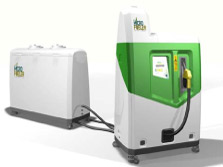MicroFueler runs cars on old beer
$10,000 home pump automates conversion of waste to ethanol

The world's first domestic waste-to-ethanol fuel system has been launched by Californian company E-Fuel.
The $10,000 (£6100) MicroFueler is an ethanol micro-refinery that can convert anything from stale beer to lawn trimmings into petrol replacement ethanol.
The first prototype MicroFueler has already been installed in a San Diego business, with shipments beginning this month.
Beer power
The MicroFueler comes in two parts: a feedstock tank that users fill with organic waste, and a distillation and pump unit that also holds the ethanol fuel. Although the system runs most efficiently with materials high in sugars and alcohols - such as waste wine and beer - it can also convert everyday food and garden waste in a three-step process.
The first step is the user choosing either distillation (for old beer) or fermentation (for organic waste) mode. Sensors then determine the appropriate amount of water to flow into the tank for proper fermentation, where ceramic cooler and heater devices maintain the correct temperature.
Once fermentation is completed, the mix is transferred to the MicroFueler distillation system for alcohol water separation using low temperature vaporisation. Finally, after both purified water and alcohol exit, the distillation system sends the liquids to be cooled before entering their completed storage containers. The ethanol is now ready to be pumped into a vehicle.
Get daily insight, inspiration and deals in your inbox
Sign up for breaking news, reviews, opinion, top tech deals, and more.
According to E-Fuel, the MicroFueler will convert organic waste into ethanol in "a few hours". Dealers will also deliver pre-fermented organic waste so the distillation process occurs immediately. E-Fuel's plan is to contract with customers to supply them with a unit and waste beer from local brewers, charging them an agreed fee of around $2 gallon (32p a litre) for the fuel they pump.